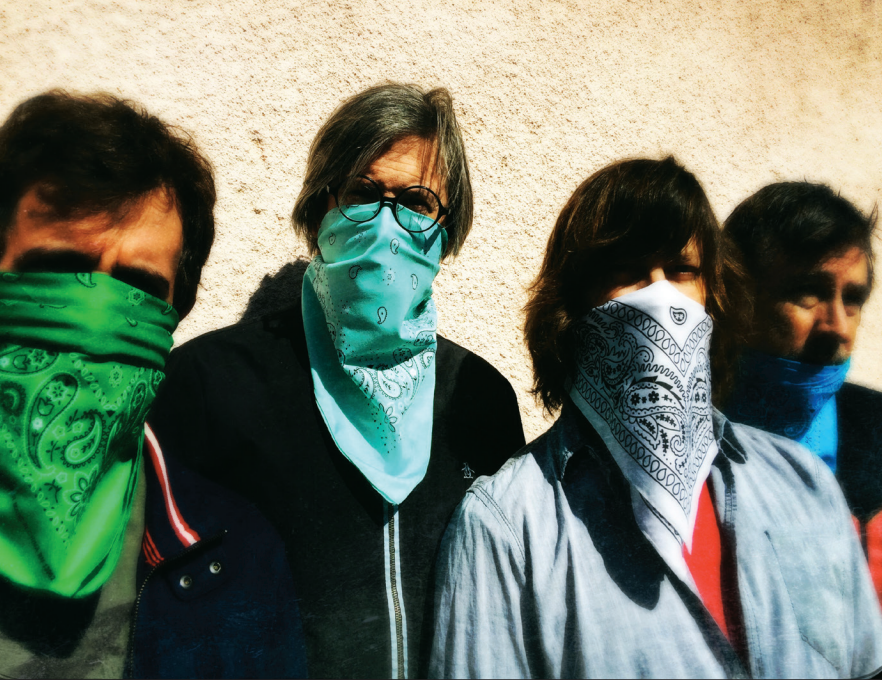My Page: Old 97’s Rhett Miller

There is the guy, and then there is the guy in the song. The guy has a real life—messy and convoluted, marked by devastation and success. The guy in the song has a single moment that exists within the framework of the song and in the imagination of the listener. The guy will die someday. The guy in the song lives forever. They are both deeply flawed.
The guy writes songs for a living. He knows that some of them are lousy. But some of them are pretty great. One of the great ones comes to him at 3 a.m., in the back lounge of the tour bus, after the rest of the band and crew have trundled of to their bunks. The guy has given up drinking and smoking and the song is what is left, maybe all that’s left. It’s a sad song, but it sounds pissed. It has to sound pissed, otherwise it’s just self-pity. He’s wailing now in the back lounge: “All who wander are not lost,” which is a pretty standard rock-and-roll sentiment, but then he completes the thought with “Just me.” What? Who does this guy think he is?
He thinks he’s the guy in the song—alone in that back lounge, with the intermittent yellow line scrolling below him, and the drummer’s snores drifting in beneath the sliding door. He knows that the guy in this song is a separate entity. By necessity, the guy remains aware of the gulf between himself and the guy in the song. That distance lets him say anything. It lets him tell the truth. The shameful, awkward, fundamental truth.
But tonight, he’s the guy in the song—for an hour or so. And it hurts in a way that approximates pleasure. The pleasure of release, unburdening. He gives in to this blurring of lines because it strikes him as a necessary breaking of rules. And the song presents itself.
He has other songs in his pocket. He will deliver them to the band with a mixture of shyness and pride. Some of the songs were written with friends. When he writes with these other folks, it’s easy to keep it clear who he is and who the guy in the song is. Writing with friends lets him laugh at the guy in the song and point out the obvious weaknesses and massive character flaws that are somehow invisible to that guy.
The worst sin one can commit during the act of songwriting is the sin of earnestness. The poor sap sitting on the stairwell singing about buying his love a cherry deserves to have his nylon strings smashed, simply because he wants us to admire the depth of his feelings. Feelings are gross.
And yet, here the guy is in the back lounge in the dead of the night. He’s climbed into the skin of the guy in the song, and that guy is all feelings. He grapples with these gross things, singing, “I must love to be confused.” He gets to the chorus and can’t convince himself to stop after singing, “All who wander are not lost.” He must continue to the conclusion that resides beyond the line of what is cool. “Just me,” he sings. And the “me” in the song isn’t some hypothetical, fictional dude. It’s him. It’s me.
I’ve been writing songs since I was 13 years old. Most of them were lousy. Some of them are great. I’ve also gotten better as I’ve gotten older. But I’ve gotten more aware of the process and my place in it, which makes it harder sometimes.
The songs on Graveyard Whistling feature lyrics issued from the perspective of a narrator, like every one of the thousands of songs I’ve written over the last three decades. But on this record, more than any other, I’ve let that line blur between the narrator and myself. Time travel was involved.
The 97’s started almost a quarter-century ago, and we play songs onstage every night that predate even that milestone. Twenty years ago, we went of to El Paso to record our first record for our new major-label bosses at Elektra. The songs on that record examined the heady and harrowing ascent from obscurity to renown. They were written mostly in the dead of night by a terrified and excited young man who looked a lot like me and found himself slipping occasionally across that invisible border, becoming the guy in the song.
Twenty years later, having navigated a career that has exceeded even the wildest expectations of our younger selves, we landed back in that same room in El Paso. While the songs I brought to the band back then seemed to emanate from the persona of a naïf on the brink of a great adventure, these new songs feel like they are being sung during a quiet moment amid the chaos at the heart of that adventure. They concern questions of culpability, fear of judgment and ruminations on the afterlife abound.
I’m the guy, but I’m also the guy in the song. Please don’t tell anybody.



















